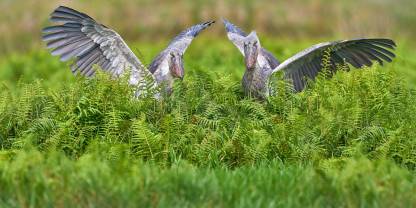Mabamba Swamp is possibly the most reliable spot in Uganda, and for that matter in any accessible part of Africa, to see the iconic shoebill. A Ramsar Wetland, it lies on the northern shore of Lake Victoria and is informally protected by a community-run ecotourism project. Shoebills are the star attraction, but visits to Mabamba regularly yield sightings of 50-odd bird species.

-
Best Time To Go
- August to September and December to February (Best for spotting shoebill)
-
High Season
- June to September (Peak time for Uganda)
-
Size
- 24km² / 9mi²
-
Altitude
-
1,133-1,183m /3,717-3,881ft
 View Photos
View Photos
 View Photos
+24
Photos
View Photos
+24
Photos
Pros & Cons
- Atmospheric boat excursions into a beautiful tropical swamp
- An excellent chance of close-up shoebill sightings
- A wealth of other alluring waterbirds
- Occasional sightings of the secretive sitatunga antelope
- Fees are reasonable and contribute to community-based conservation efforts
- Close to Entebbe International Airport
- For wildlife-lovers, it’s a great overnight alternative to the capital city Kampala or nearby Entebbe
- No Big Five or other typical safari animals
- Despite the best efforts of the guides, shoebill sightings cannot be guaranteed
Wildlife
Mabamba is primarily a bird-watching destination. More than 300 bird species have been recorded, including many alluring wetland dwellers. In addition to shoebill, this is a good place to look for African pygmy goose, African jacana, blue-headed coucal, long-toed lapwing, blue-cheeked bee-eater and water-associated raptors such as African fish eagle, palm-nut vulture and osprey. Large mammals are scarce, but lucky visitors might catch a glimpse of the sitatunga, a localized swamp-loving antelope.
Scenery
Mabamba Swamp is very atmospheric. Dense stands of papyrus swamp are run through by a labyrinth of channels covered in water-lily pads and their blue, pink and white flowers. The swamp is fringed by riparian forest and opens out to the vast waters of Lake Victoria, which is the largest freshwater body in Africa and second-largest in the world.
Activities
The best way to explore Mabamba Swamp is on a guided boat trip operated by the community tourism program. This will usually involve a combination of motoring through the open water and poling in the shallows. The guides are skilled at locating shoebills and very good at identifying the many other birds that inhabit the swamp. Visitors can arrange an all-inclusive tour from Entebbe or Kampala, or save money by making their own way to Mabamba and picking up a boat there.
Weather & Climate
The Lake Victoria shore around Mabamba (which lies almost on the equator) has a warm year-round climate, and rain is possible at all times of year. There are two relatively Dry seasons, one from December to February and the other from June to August, while the wettest months are April and May. More info:
Best Time To Visit Mabamba Swamp
Mabamba Swamp can be visited at any time of year, but the ideal months are August to September and December to February. Shoebills are harder to spot over the nesting season of June and July, when they tend to stay deep in the swamp. There is an increased risk of stormy weather from March to May and October to November.
How To Get to Mabamba Swamp
Mabamba Swamp lies little more than 10km/6mi east of Entebbe and its international airport as the crow flies. The quickest way to get between the two is by boat, on an organized motorboat tour. It is also possible to drive, but you need to allow around 90 minutes* to cover the roughly 50km/30km road route via the town of Kisubi, much of which is on dirt. Theoretically, you can drive from Entebbe to Mabamba more directly using the Nakiwogo-Sazi car ferry, but in reality, this often results in long delays.
*Driving times are only a rough indication. You should always consider the possibility of significant delays.
Health & Safety
Please read our malaria and vaccinations page for Uganda, and our general ‘Wildlife Viewing Safety Precautions’ below for more info:




